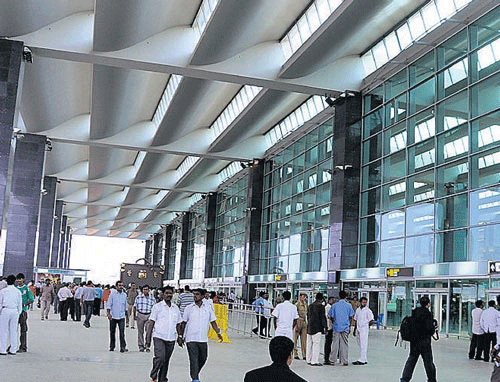Miscalculation of building height in the original plan proves costly.
Faced with mounting challenges to fund its expansion plans, the Bangalore International Airport Limited (BIAL) is seeking a 131 per cent hike in landing fee for international flights and a hefty increase in User Development Fees (UDF).
But its revenue generation capacity wouldn’t have been in bad shape had its five-star airport business hotel project taken off in right earnest.
The hotel construction --said to be about 60 per cent complete -- is now on hold, and there is no hope in the horizon for the work to restart anytime soon. Here’s why: BIAL has challenged an order by the Arbitral Tribunal that directed it to pay Rs 301 crore to the consortium chosen to build the hotel. The airport promoters’ burden also includes 18 per cent interest for delayed payment, and refund of a security deposit of Rs 76.4 crore with interest at the rate of 18 per cent.
The consortium of hospitality major East India Hotels (EIH) and Larson &Tourbo had bagged the rights to design, construct, finance, commission, maintain, manage and operate the hotel. As early as November 16, 2006, BIAL and the two consortium partners had inked a Framework Agreement and a joint venture company, Bangalore Airport Hotels Limited (BAHL) was incorporated. BAHL had paid the security deposit in 2006.
The project began to falter once the Airports Authority of India (AAI) issued its No Objection Certificate (NOC) for a building height of only 30.35 meters from the ground level, way below the 45 meters specified under the original bid. After BIAL issued an in-principle approval for the hotel’s layout and plan in October 2007, it took over a year, November 14, 2008 to be precise, for AAI to issue its NOC.
The cascading effect of this NOC proved extremely tricky for the project. The original plan for a hotel with 321 keys and a total area of 273,404 sq ft had to be reworked.
The number of rooms were to be reduced.
The Consortium, which had already commenced construction, wanted certain concessions from BIAL since the terms of the Framework Agreement had changed. When talks failed, the parties agreed to go in for arbitration. The tribunal’s ruling, however, proved a shocker for BIAL. It has now challenged it in the Principal District and Sessions Judge, Devanahalli, a process that will take much time.
But questions are now being asked as to why the building height was miscalculated in the original plan, although the stakeholders had enough expertise in airport infrastructure specifications.
This single factor, which could have been sorted out through initial consultations with AAI, eventually proved decisive.
An aerodromme expert contended: “Very few hotels in the City have 300 rooms. The airport hotel could have generated big revenue and catered to pilots, crew members besides the big ticket visitors and businessmen.”
State government officials said the calculations were taken when Zurich Airport was a major stakeholder in BIAL. The GVK Group had acquired 12 per cent stake in November 2009 from Zurich Airport, which earlier held a 17 per cent stake.
It is learnt that negotiations to find a new firm to complete the hotel are now in an advanced stage. But construction can begin only after the arbitration process is completed and the payments made.
It would still take another seven to eight months before the building is ready. Sources said BIAL would have to keep its cash flows within limits and approach banks for more “expansion” funds.
